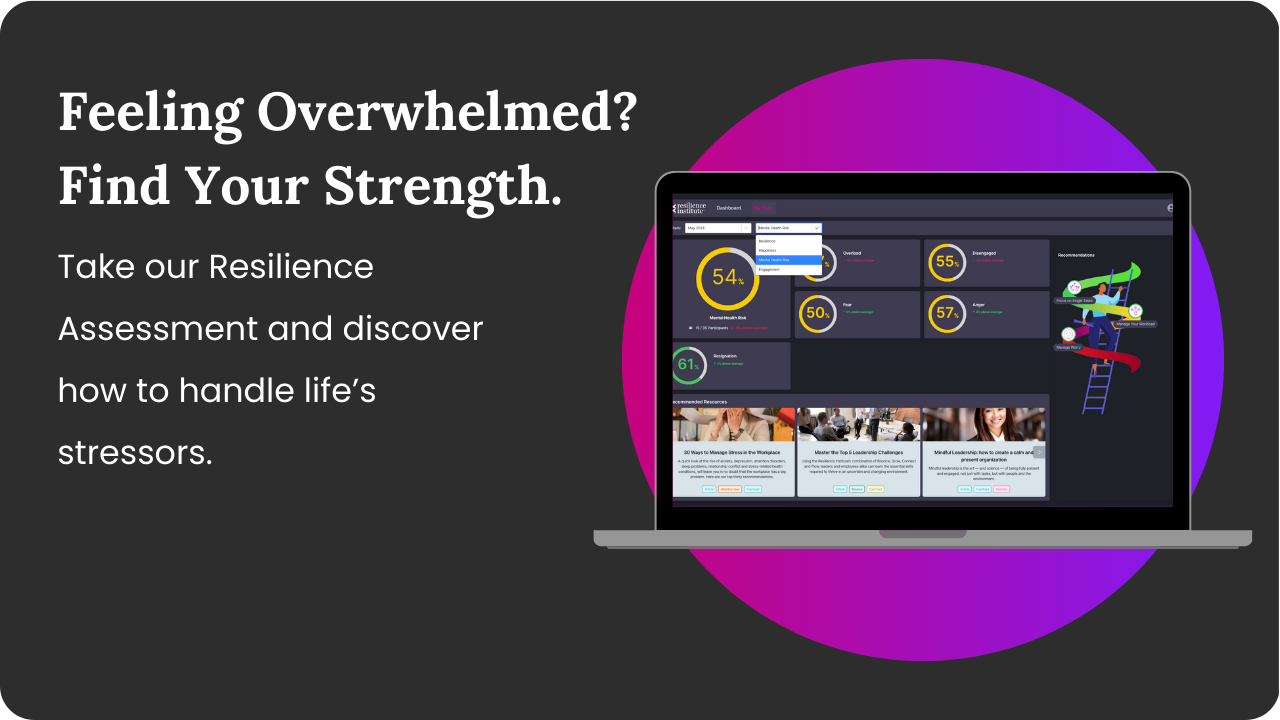
How Overstimulation is Draining Your Energy—And How Resilience Can Help You Bounce Back
We live in a world that’s constantly buzzing—whether it’s notifications, social media updates, or the demands of daily life. For many of us, this flood of information can feel overwhelming, leading to a phenomenon known as overstimulation. But what if there was a way to protect yourself from this overload? The answer lies in building personal resilience.
What is Overstimulation?
Overstimulation occurs when your brain is hit with more information than it can process, whether from devices, noise, or fast-paced environments. In fact, studies show that urban dwellers are 40% more likely to develop anxiety or mood disorders due to the constant sensory input around them (Lumende). The average person checks their phone 150 times a day, contributing to the overwhelming mental load (NeuroLaunch.com).
Are You Overstimulated?
If you often catch yourself saying things like, “I feel like I can’t concentrate,” or “I constantly feel on edge,” you may be overstimulated. Do you struggle with mental fatigue after a day of endless tasks? Feel anxious in noisy environments or find it hard to unwind before bed? These are all signs that your brain is overloaded. Recognizing this is the first step toward managing it—and we’re here to help.
Signs You’re Overstimulated
Look out for these common signs of overstimulation:
- Difficulty concentrating: Tasks that used to be easy now feel overwhelming.
- Physical symptoms: Headaches, muscle tension, or a racing heartbeat can accompany overstimulation (NeuroLaunch.com).
- Anxiety and restlessness: It feels like your mind is running at full speed, even when you’re trying to relax.
- Sleep issues: Struggling to sleep or waking up feeling just as tired as before is another key indicator.
Millennials, Gen Z, and the Impact of Overstimulation
Millennials and Gen Z are especially vulnerable to overstimulation. We grew up with technology, and while it’s become a natural part of life, it’s also one of the biggest contributors to stress. A recent report found that 75% of Gen Z say they feel overwhelmed by the constant presence of technology (Psychology Today). For many, this digital overload is affecting mental health, contributing to higher rates of burnout and anxiety.
Tips to Manage Overstimulation
Here are some practical steps to reduce overstimulation and boost your resilience:
- Take a digital detox: Even a short break from screens can help. Try setting your phone aside for an hour each day to give your mind some breathing room.
- Practice mindfulness: Techniques like deep breathing, meditation, or mindful walking can help you stay grounded and reduce stress (NeuroLaunch.com).
- Set boundaries: Say no to unnecessary commitments or tasks that drain your energy. This helps you focus on what’s truly important.
- Create a calming environment: Limit noise and distractions by using noise-canceling headphones or setting up a quiet space in your home (NeuroLaunch.com).
- Prioritize sleep: Getting consistent, high-quality sleep is essential for your brain to recover from daily sensory input (Lumende).
Recommended Books and Resources for Overstimulation
To dive deeper into understanding and managing overstimulation, here are three excellent resources:
- “Digital Minimalism” by Cal Newport: This book explores how reducing digital distractions can help you live a more intentional, less overstimulated life.
- “The Highly Sensitive Person” by Elaine N. Aron: A great resource if you often feel overwhelmed by sensory input. It offers insights into how to protect yourself from overstimulation.
- TED Talk: “How to Make Stress Your Friend” by Kelly McGonigal: This video offers a fresh perspective on stress and how to harness it in a positive way, especially in today’s overstimulating world.
Building Resilience to Combat Overstimulation
Resilience is your ability to recover and adapt to stress, which is crucial when dealing with overstimulation. It’s not about eliminating stress entirely but learning how to manage it more effectively.
By taking small steps—like mindfulness practices and setting clear boundaries—you can build the mental strength needed to withstand life’s constant demands. But the best way to start is by understanding where you stand right now. Knowing your strengths and areas where you’re more vulnerable can give you a clearer path forward.
Take the First Step: Know Your Resilience
The most effective way to manage overstimulation is by getting to know your current state. Our Resilience Assessment helps you uncover your strengths and identify where you might be at risk for stress overload. With this personalized insight, you can build the habits that best suit you, helping you navigate a world that never seems to slow down.
Take the Resilience Assessment now and start your journey to a calmer, more resilient life.

